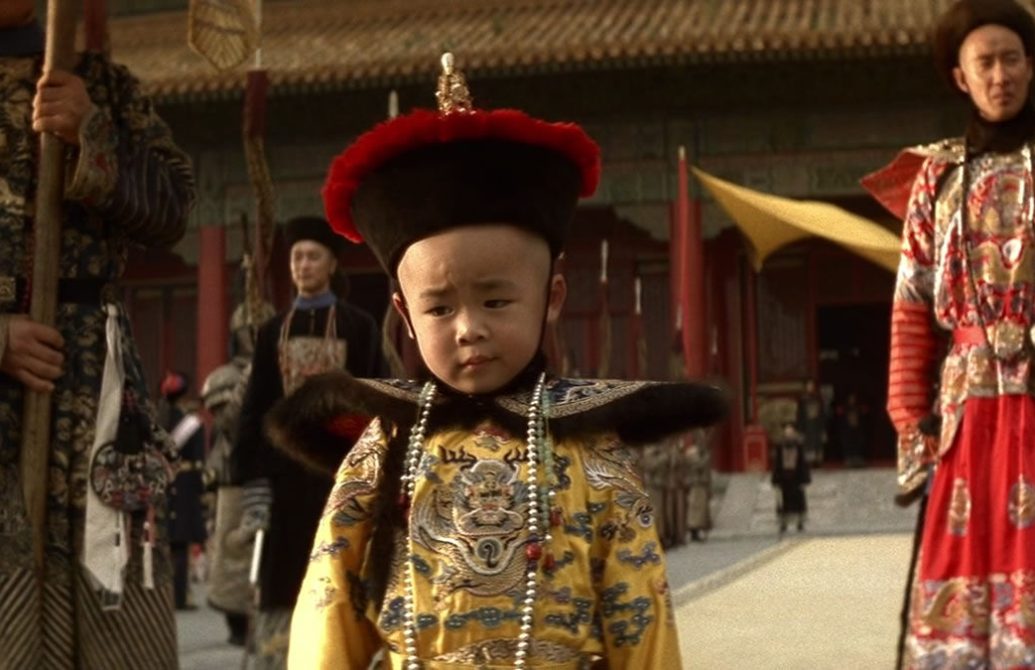The sun sets over the Forbidden City. At the entrance, an old man buys the last ticket of the day to see the throne. Noticing no one around, he steps up and sits on it. Suddenly, a little boy runs over, telling him he can’t do that. The old man tells the boy he’s allowed to—because that throne was once his seat. As the boy wonders whether this old man has lost his mind, the man quickly turns the throne, pulls out a box containing a cricket from behind it, and hands it to the child.
Then the old man disappears. But his fate lingers in the minds of many, especially those who’ve seen Bernardo Bertolucci’s 1987 film The Last Emperor, based on the autobiography of Puyi, the final emperor of China.
The Man Above All
In feudal times, a person’s destiny was tied to their parents’ social status and the place of their birth (if this still holds true today, the grip of feudalism is truly haunting). An individual was either granted everything or stripped of it all to uphold a social order that best secured the ruling class’s power. For Puyi, being three years old, born into the Aisin Gioro clan, and chosen by Empress Dowager Cixi was more than enough to ascend the throne and become the man above all.
This ordinary little boy was like any other: crying when taken from his mother, delighting in mischief to be spoiled, and full of playful antics. The upbringing in the palace (where few dared to truly discipline the Son of Heaven) turned him into a child king. Little Emperor Puyi gradually molded himself to fit the throne.
His young mind’s sense of self-importance took shape and solidified over the years. It seems once someone becomes a king, they can never return to being ordinary. The portrait of this emperor grew sharper. I feel that if you treat a king like a king, he’ll be easygoing—even naive—but threaten his position, and he’ll turn aggressive, even ruthless.
Lacking genuine love and honest guidance, Puyi still reigned as emperor. It turns out there are many ways to be an emperor. Some require effort and bloodshed, while others simply demand being born at the right moment. But this emperor wielded little real power beyond ordering around eunuchs—at the steep cost of them plundering the court’s wealth. Puyi had fully embraced the role handed to him.
Even when expelled from the Forbidden City, he didn’t realize the play had ended. He lingered, trying to keep acting, only to plunge himself into misery. Like kings before him, from East to West, he never wanted to abdicate. Monarchs crave grand ceremonies for life—and even after death, their bones must rest in majestic tombs.
A King Past His Time
What I find both amusing and pitiable is that throughout his youth, Puyi longed to leave the Forbidden City. Yet when he was “invited” (really, forced) out, he hesitated, clinging to it. This reveals an immature king, lacking resilience. The indulgent, cloistered life of the palace had ruined him. The throne shaped his worldview into something subjective and dull to the ways of the world.
What does it mean to be an emperor? Puyi likely never asked himself this. At times, he acted decisively—threatening corrupt eunuchs or impulsively cutting off his queue—but these rash moves didn’t reflect a ruler’s gravitas; they showed the impulsiveness of a young man coming of age.
This outdated king was like a sleepwalker refusing to wake. He became a playboy outside the palace, squandering money, still believing he’d reclaim his crown. After learning his ancestors’ tombs were desecrated, Puyi allied with the Japanese to be installed as emperor of Manchukuo. That choice turned him, once again, into a puppet king. When Japan lost the war, he became a war criminal, imprisoned and “reformed” for ten years.
In those ten years of captivity, Puyi learned basic human skills: personal hygiene, caring for others, tying shoelaces, planting trees. After his release, he lived as a gardener.
One late afternoon, as you and I know, an old man bought a ticket to visit the Forbidden City. He still believed he was a king and spoke his truth. Setting aside right or wrong, that fierce belief kept Puyi alive. Life’s meaning comes to us—or we craft it—in our own ways. For him, perhaps it was being an emperor, though what that meant remained unclear.
A Life Forever Imprisoned
The cricket box young Puyi received long ago seemed a omen of his life: a confined existence chirping faintly to prove its presence, occasionally brought out to amuse its master.
He was repeatedly caged—in palaces, mansions, then prisons—and through it all, tethered to memories of golden days. Still, he was human, innocently believing he ruled others while forgetting that without mastering his own fate, he couldn’t master anyone.
In the film, he had two wives: Wanrong and Wenxiu. One unilaterally divorced him, despite his refusal. The other betrayed him out of love, though he loved only his title. His obsession with clinging to the throne made him forget that a person doesn’t need a golden chair to live happily.
The foreign tutor Johnston also left an impression on me. Johnston was shrewd, fulfilling his duties precisely. He was polite or subtly mocking, pitying yet detached, avoiding truths Puyi didn’t want to hear. He had a professional air, but I believe he fell short of a true teacher’s calling: the courage to sincerely correct a student’s flaws. Before leaving China, Puyi asked if he could be king again. Johnston said yes. Had he been more honest, Puyi’s later life might have differed. Like many emperors before him, Puyi’s misfortune was never hearing the truth from those closest to him.
The first half of Puyi’s life basked in riches thanks to fate; the second half endured hardship and bitterness because of it. Accustomed to predestination and dependence, he wasn’t adept at making his own choices. His prison years perhaps showed him that the servitude of eunuchs and courtiers had, in turn, enslaved him, making him a host for their parasitism without him realizing when it began.
The turbulent life of the last emperor of the Qing dynasty and China’s monarchy fades quietly, like the sun at dusk, carrying a mournful, nostalgic regret.
I don’t feel much pity for the emperor, but I do for the frail old ex-emperor who had to buy a ticket to visit his former home, his final breaths still tinged with an obsession for the throne. The curtain fell, the audience left, yet the aging actor diligently played his life’s role to the very end. These personal events seem to whisper something about human nature and identity.
In Place of a Conclusion
The Last Emperor is a nearly three-hour film about an emperor who lived 61 years, tasting glory and disgrace. Three hours feels long for a movie, yet short—like the Dream of the Golden Millet. The tale goes:
“Once, Lu Sheng failed his exams and stopped at an inn to rest. An old man lent him a pillow. Lu Sheng slept and dreamed he passed the imperial exams, became a high official, enjoyed over 20 years of glory, and saw his family prosper with children and grandchildren. Waking, he realized it was just a dream. The inn’s millet hadn’t even finished cooking. It speaks of a beautiful, fleeting dream.”
It seems every human heart holds—or once held—a beautiful dream. A life without dreams is dull, but a life lost in dreams without reality is fanciful. An emperor is human too, and every human must learn to be human before being an emperor.
Stepping into education for a moment, I think overindulging and sheltering children without teaching responsibility or respect for others is the fastest way to raise “little kings.” These “little kings” may revel twice as much in childhood but will face triple the hardship and bitterness when facing the world.















